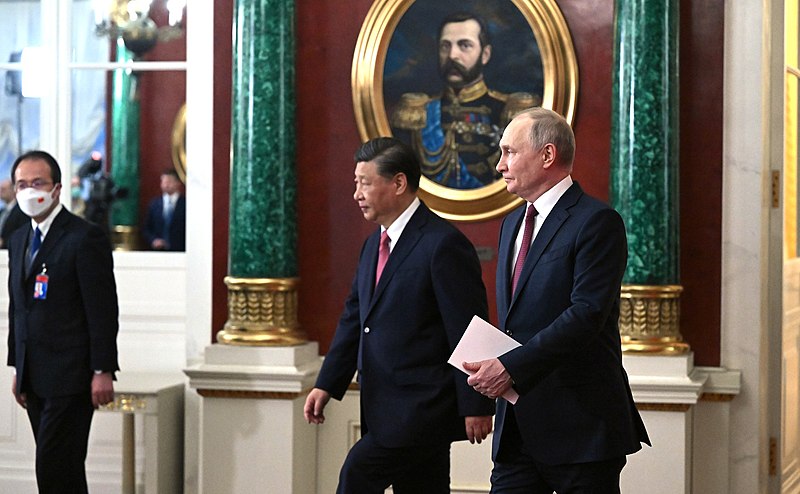The NATO military alliance said Russian leader Vladimir Putin’s nuclear rhetoric was “dangerous and irresponsible” following Putin’s move to station tactical nuclear weapons in Belarus. Putin’s remarks would indicate one of the clearest nuclear signals by Moscow since it invaded Ukraine in February last year.
NATO spokesperson Oana Lungescu told Reuters in an emailed statement on Sunday that Putin’s rhetoric was contrary to that of the alliance’s nuclear sharing. Lungescu added that Russia has often broken its own commitments when it came to arms control.
Putin said he plans to station tactical nuclear weapons in Belarus, comparing the move to the United States stationing its weapons in Europe while Washington insists that Russia not breach its nuclear non-proliferation commitments. The US has since downplayed the concerns about Putin’s move, but the alliance said Putin’s non-proliferation pledge and comparison of overseas US weapons deployment was inaccurate.
“Russia’s reference to NATO’s nuclear sharing is totally misleading. NATO allies act with full respect of their international commitments,” said Lungescu in the statement. “Russia has consistently broken its arms control commitments.”
Kyiv has since called for a meeting by the United Nations Security Council in response to Putin’s remarks. A top Ukrainian adviser to President Volodymyr Zelenskyy, Oleksiy Danilov, said Moscow’s plan would also destabilize Belarus, saying that Minsk has been “taken hostage” by Russia. Another adviser to Zelenskyy, Mykhailo Podolyak, also brushed off Putin’s comments on Twitter.
“He admits that he is afraid of losing & all he can do is scare with tactics,” tweeted Podolyak.
The US said there appears to be no change in the potential use of nuclear weapons by Russia in the war, and NATO said the remarks by Putin would not change the alliance’s nuclear stance.
Meanwhile, the British defense ministry said in its intelligence update on Monday that at least three unmanned surface vessels and one unmanned drone sought to strike the Russian naval base in Sevastopol in the annexed Crimea region. Reports said that one USV was struck by defensive booms while the other two were destroyed in the harbor.
“Even though the new attacks likely failed to damage any military assets, the USV threat likely continues to constrain operations of Russia’s Black Sea Fleet,” said the ministry.



 Trump Allegedly Sought Airport, Penn Station Renaming in Exchange for Hudson River Tunnel Funding
Trump Allegedly Sought Airport, Penn Station Renaming in Exchange for Hudson River Tunnel Funding  New York Legalizes Medical Aid in Dying for Terminally Ill Patients
New York Legalizes Medical Aid in Dying for Terminally Ill Patients  China Warns US Arms Sales to Taiwan Could Disrupt Trump’s Planned Visit
China Warns US Arms Sales to Taiwan Could Disrupt Trump’s Planned Visit  Iran–U.S. Nuclear Talks in Oman Face Major Hurdles Amid Rising Regional Tensions
Iran–U.S. Nuclear Talks in Oman Face Major Hurdles Amid Rising Regional Tensions  U.S.-India Trade Framework Signals Major Shift in Tariffs, Energy, and Supply Chains
U.S.-India Trade Framework Signals Major Shift in Tariffs, Energy, and Supply Chains  Nighttime Shelling Causes Serious Damage in Russia’s Belgorod Region Near Ukraine Border
Nighttime Shelling Causes Serious Damage in Russia’s Belgorod Region Near Ukraine Border  Trump Backs Nexstar–Tegna Merger Amid Shifting U.S. Media Landscape
Trump Backs Nexstar–Tegna Merger Amid Shifting U.S. Media Landscape  US Pushes Ukraine-Russia Peace Talks Before Summer Amid Escalating Attacks
US Pushes Ukraine-Russia Peace Talks Before Summer Amid Escalating Attacks  Trump Allows Commercial Fishing in Protected New England Waters
Trump Allows Commercial Fishing in Protected New England Waters  India–U.S. Interim Trade Pact Cuts Auto Tariffs but Leaves Tesla Out
India–U.S. Interim Trade Pact Cuts Auto Tariffs but Leaves Tesla Out  Norway Opens Corruption Probe Into Former PM and Nobel Committee Chair Thorbjoern Jagland Over Epstein Links
Norway Opens Corruption Probe Into Former PM and Nobel Committee Chair Thorbjoern Jagland Over Epstein Links  U.S. to Begin Paying UN Dues as Financial Crisis Spurs Push for Reforms
U.S. to Begin Paying UN Dues as Financial Crisis Spurs Push for Reforms  Trump’s Inflation Claims Clash With Voters’ Cost-of-Living Reality
Trump’s Inflation Claims Clash With Voters’ Cost-of-Living Reality  Jack Lang Resigns as Head of Arab World Institute Amid Epstein Controversy
Jack Lang Resigns as Head of Arab World Institute Amid Epstein Controversy  TrumpRx.gov Highlights GLP-1 Drug Discounts but Offers Limited Savings for Most Americans
TrumpRx.gov Highlights GLP-1 Drug Discounts but Offers Limited Savings for Most Americans  Trump Signs Executive Order Threatening 25% Tariffs on Countries Trading With Iran
Trump Signs Executive Order Threatening 25% Tariffs on Countries Trading With Iran  U.S. Announces Additional $6 Million in Humanitarian Aid to Cuba Amid Oil Sanctions and Fuel Shortages
U.S. Announces Additional $6 Million in Humanitarian Aid to Cuba Amid Oil Sanctions and Fuel Shortages 































